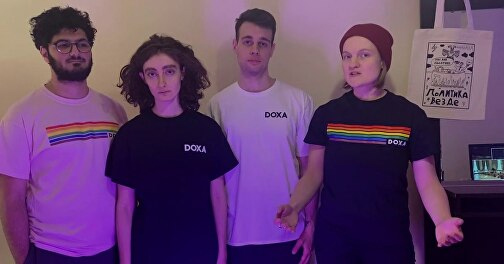[vc_row][vc_column][vc_column_text]

Student journalists at Doxa
Index on Censorship has expressed concern over four student journalists charged with allegedly inciting minors to take part in criminal activity.
Armen Aramyan, Alla Gutnikova, Vladimir Metelkin, and Natalia Tyshkevich, journalists at online magazine Doxa – an independent student magazine about the realities of modern university life – were arrested on 14 April. The arrest of the students – from the Higher School of Economics and Moscow State University of Civil Engineering – came after they reported on protests in support of opposition leader Alexei Navalny and publishing a video in which they argue that the expulsion of students from university for participating in actions in support of Navalny is illegal.
The video, published by Doxa on 22 January, prompted the Russian media watchdog Roskomnadzor to order its removal, a decision which Doxa subsequently challenged.
Roskomnadzor claimed the video was “persuading or otherwise involving minors in committing illegal actions that pose a threat to their life and health.”
The charges against the four are under 151.2 of the Russian criminal code, which carries a sentence of up to three years in prison for “involving a minor in committing acts that pose a danger to the life of a minor”.
Doxa’s offices were searched along with the homes of each of the four on trial, with their equipment seized.
The journalists are now under heavy pre-trial restrictions, which prevents them from leaving their homes, using the internet, or speaking to anyone except their close relatives and lawyers.
Since the arrests, more than 270 academics around the world have expressed their support for the four in an open letter, calling the charges “preposterous”.
Doxa said in a statement that the targeting of the student journalists is indicative of Russian authorities’ clamping down on free thought within universities.
They said: “In early 2021, we learned about the unprecedented pressure on students in Russian educational institutions. Schoolchildren, their parents, college and university students were threatened with possible problems, legal prosecution and expulsion due to participation in actions in support of Alexei Navalny, who was detained upon arrival in Russia.”
Protests in support of Navalny began in January, with over 5,000 people estimated to have been arrested across the country at the time amid some of the largest protests seen in opposition to President Vladimir Putin. In response, Russian authorities have since attempted to crack down on journalism and protests.
Index CEO Ruth Smeeth defended the rights of the Doxa four and described student journalism as “a building block of media freedom”.
“Repressive regimes silence opposition when they are scared of their populations and when they fear losing power. The Kremlin’s behaviour towards student journalists shows how fearful, yet again, they have become of their own people,” she said.
“Student journalism is a building block of media freedom, it educates and informs as well as ensuring the lifeblood that feeds the next generation of journalists. We are horrified at the targeting of the Doxa magazine and their student editors and we stand united in solidarity with them.”
Director of Global Youth & News Media, an organisation that aims to amplify youth journalism, Dr Aralynn Abare McMane said: “It shows just how desperate the Russian authorities are becoming that they persecute these student journalists, and we are gratified to see that the international press freedom community is taking this case very, very seriously.”[/vc_column_text][/vc_column][/vc_row][vc_row][vc_column][three_column_post title=”You may also want to read” category_id=”8996″][/vc_column][/vc_row]




